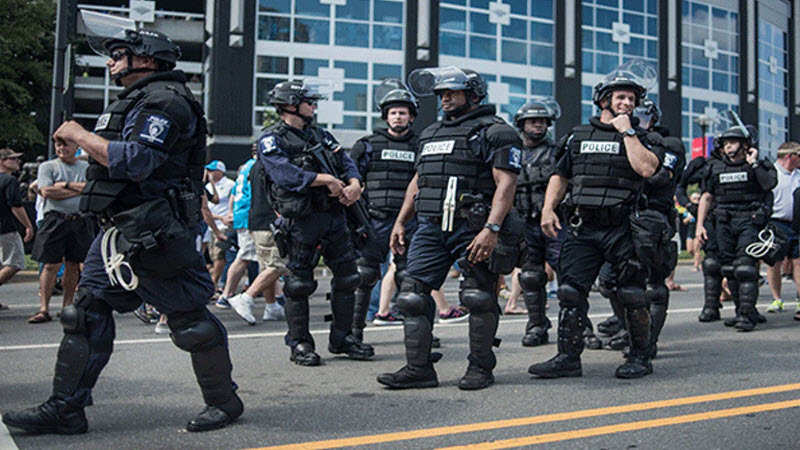

By Phoebe Glick
STATE CAPITOL – California Senate Bill 731 has been introduced here, and it promises to address bad cops who manage to dodge discipline and get hired by another law enforcement agency that knows little or nothing about officers’ checkered pasts.
If the measure passes, police officers will be licensed just like lawyers, doctors, nurses—and even your hair stylist.
Authors of SB 731 cite examples of a system of non-regulation:
In 2016, Caren Carl Madoyan was fired from the Los Angeles Sheriff’s Department following allegations of domestic violence and stalking—just three years later, he was rehired by current Sheriff Alex Villanueva after playing a key role in Villanueva’s campaign for office.
This rehiring came over protestations from the County Director of Personnel, admonishing that Madoyan be removed from the eligible hiring register immediately.
This isn’t the first time the Los Angeles Sheriff’s Department has carried out dubious hires. In 2012, it hired several sheriff’s deputies from the recently disbanded Maywood Police Department, closed because it was notorious for being so “heavy-handed (with) under-qualified officers,” causing the city to face so many lawsuits that insurance prices became prohibitively high.
Maywood had a reputation for taking in officers who were unemployable elsewhere or discharged dubiously—the LA Times found that “at least a third of the force had left other police jobs under a cloud” of suspicion or had violated laws while employed in Maywood.
Many ex-Maywood employees were considered by LAPD and not hired, but four made it through. These four men had dubious track records, including perjury, discharging weapons while off-duty and drunk, and lying to superiors.
This is representative of an overall trend in California: officers dismissed from one department or agency may be hired at a new location with very few questions asked.
SB 731 aims to address this ill, and to reform policing by requiring police officers to be licensed, as in other professions like law or medicine.
SB 731 would establish a protocol for decertifying police officers who are fired for misconduct, or those who resign before misconduct investigations. This decertification process would bring California up to speed with the other 45 states that already have such processes in place. Decertified officers would also be added to the National Decertification Index, allowing for further (and inter-state) oversight.
California’s existing Commission on Peace Officer Standards and Training stands to be strengthened by SB 731. POST already handles duties like regulating training and certifications for police. If the bill is passed, POST would be able to conduct investigations into police misconduct, as opposed to leaving that power with departments which are not always motivated to uncover wrongdoing.
Further, local law enforcement would be required to report fired officers to the state. During hiring processes, local agencies and departments would need to contact the state and look into why an officer left a previous position.
Through these measures, SB 731 aims to increase oversight of police officers and ensure that bad actors cannot be rehired elsewhere. It would increase hiring departments’ awareness of potential hires’ pasts, and would more effectively investigate and document police misconduct.
Advocates of SB 731 say this represents long-awaited victories in terms of accountability for police.
The ACLU touts that SB 731 would strengthen California’s Bane Act, lowering near-insurmountable burdens of proof on plaintiffs suing the police for civil rights violations and even chipping away at qualified immunity.
The ACLU applauds SB 731 as a measure that will crack down on “abusive cops” and give “families the opportunity to hold police officers accountable” for violations of civil rights.
Those pushing for doing away with police entirely are less than impressed.
Mariame Kaba, an anti-criminalization organizer, says that reform is an impossible promise, explaining, “The surest way of reducing police violence is to reduce the power of the police, by cutting budgets and the number of officers. Any reforms are doomed to fail like others before them—the police were formed to uphold the status quo and therefore are rotten from the inside.”
Advocates like Kaba say that SB 731 promotes the erroneous notion of the “bad apple” cop, without whom the police system would be free of problems and prejudice, noting that some officers are worse than others, but they’re encouraged and protected by an institution that cannot be rescued.
SB 731 will have an uphill battle to be passed and put into action.
A similar order in New Jersey is facing harsh pushback from police unions. Attorney General Gubir Grewal’s recent order to reveal the identities of officers disciplined for serious misconduct has been criticized by three state troopers unions. A joint statement claimed that the order would “harass, embarrass, and rehash past incidents” instead of promoting meaningful reform.
Senate Bill 731 can expect a similar reception from California’s powerful police unions.
To sign up for our new newsletter – Everyday Injustice – https://tinyurl.com/yyultcf9
